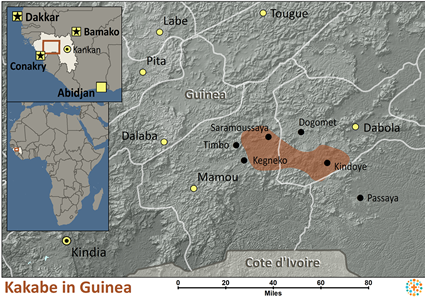The Kakabe are an ethnic group residing primarily in the Fouta-Djalon region of central Guinea. Their traditional territory is positioned between the three major regional cities of Dalaba, Mamou, and Dabola, with an additional enclave in the Kankalabé sub-prefecture. Kakabe communities are found in towns including Labe, Dalaba, Mali Yemberem, Doucki, and Pita, as well as smaller villages such as Koïn, Kolladé, Fadé Hadji, Timbi Touni, Timbi Madina, Bani, Massi, and Akolémadji. There is also a Kakabe enclave in the sub-prefecture of Kankalabé. Other villages they can be found are: Labe, Dalaba, Mali Yemberem, Doucki, and Pita. Other smaller villages in the region, noted in historical texts.
The Kakabe people are predominantly Muslim, though their Islamization occurred more recently than that of neighboring Maninka and Fula groups. Historically, their conversion was delayed because Fula slaveholders prohibited enslaved people from practicing Islam before abolition.
Linguistic patterns show that many Kakabe speakers are bilingual, particularly in Pular (Fula) and Maninka, reflecting the region's multilingual dynamics and historical interactions between ethnic groups. This bilingualism likely contributes to the discrepancy between ethnic population estimates and active language speaker counts.
The Kakabe (also spelled Kababe or Kakkabe) are a Malinke subgroup, and the Malinke are
themselves a subgroup of the larger Mande people group, descendants of the once-great Mali Empire. Kakabe is a minor and virtually undescribed language spoken in the Republic of Guinea, belonging to the Mokole group of the Mande family (Niger-Congo phylum).
The Kakabe people live in the Fouta-Djalon region in the center of the Republic of Guinea, with their area is located between the three main cities of the region: Dalaba, Mamou, and Dabola.
The Kakabe are primarily subsistence farmers, with rice as the main crop cultivated, although the humid savanna woodlands also yield cotton, peanuts, corn, and coffee. Each household also owns fruit trees around the village, which produce bananas, papayas, mangos, and other fruits.
The Malinke people are known for their ingenuity and leadership qualities, as well as their
trading, farming and mining abilities.
At present, Kakabe are Muslims, though their Islamization is more recent compared to their
Maninka and Fula neighbors, because before the abolition of slavery, Fula forbade slaves access to Islam. Since 1958, but especially in the last two decades, more and more mosques and Koranic schools have been built in Kakabe villages. The Kakabe people are entirely Muslim, though they mix Islam with tribal religion, with their
faith in spirit beings and Allah.
While no significant Christian population has been documented among the Kakabe, some urban residents may have exposure to Christianity, though Guinea remains an overwhelmingly Muslim nation.
Kakabe people need the opportunity to hear and respond to the gospel so they can be saved from their sins, live an abundant life, and have eternal life with Christ, the Savior.
Pray for God to anoint those working with the Kakabe people of Guinea with wisdom and insight, and enable them to express His truth so that it can be understood.
Pray for perseverance for all involved with this effort.
Pray for a Disciple-Making movement to flourish among the Kakabe people.
Scripture Prayers for the Kakabe in Guinea.
Vydrina, A. — The Kakabe dialectal continuum: lexicostatistical and descriptive
materials (PDF / papers). iling-ran.ru
Pangloss Collection — Kakabe corpus (CNRS / Alexandra Vydrina). pangloss.cnrs.fr
Wikipedia — "Kakabe language" (summary entry linking to Ethnologue / corpora).
Wikipedia
Ethnologue / ELAR / Glottolog entries for Kakabe (language status, ISO code kke).
| Profile Source: Joshua Project |

























